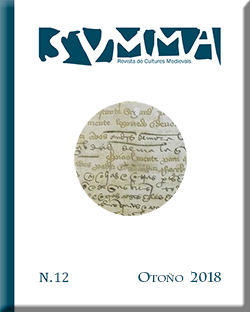Widowhood through Petitions. An Example of Notarial Activity in Fourteenth-Century Barcelona
DOI:
https://doi.org/10.1344/Svmma2018.12.4Palabras clave:
notarial activity, notarial requests, arbitration awards, widowhood, Barcelona, Late Middle AgesResumen
Notarial documentation is undoubtedly an indispensable resource for women’s history. However, whereas wills, inventories, and all kinds of contracts are frequently used as sources, notarial petitions and arbitration acts do not usually attract scholarly attention, and that despite the fact that these notarial documents provide an effective means to study the difficulties women had to face and the causes of their often challenging situation. In the case of Barcelona, the substantial presence of widows in judicial documents seems to suggest that their rights were not always respected. The fact that widows were usually “women without men” sometimes led the late husband’s heirs and relatives to try to take advantage of their difficult position for personal gain. The sources show widows defending their rights, as well as the rights of their children, especially when pursuing the restitution of their dowries, and complaining about the excessive expenses of judicial proceedings, demanding a fair and transparent trial, and expeditious rulings. Even though such situations were probably a consequence of their vulnerability, widows were able to have their voices heard in court to find a solution to their needs.
Descargas
Publicado
Número
Sección
Licencia
Derechos de autor 2019 SVMMA. Revista de Cultures Medievals

Esta obra está bajo una licencia internacional Creative Commons Atribución-NoComercial-SinDerivadas 4.0.
Los autores que publican en esta revista están de acuerdo con los siguientes términos:
a. Los autores conservan los derechos de autoría y otorgan a la revista el derecho de primera publicación de la obra. SVMMA Revista de Culturas Medievales publica con una licencia de Reconocimiento-NoComercial-CompartirIgual 3.0 España de Creative Commons, la cual permite compartir la obra con terceros, siempre que éstos reconozcan su autoría, sin ánimo de lucro y compartan la obra derivada en las mismas condiciones.
b. Los autores son libres de hacer acuerdos contractuales adicionales independientes para la distribución no exclusiva de la versión de la obra publicada en la revista (como la publicación en un repositorio institucional o en un libro), siempre que se reconozca su publicación inicial en esta revista.
c. Se anima a los autores a publicar su obra en línea (en repositorios institucionales o en su página web, por ejemplo), con el objetivo de conseguir intercambios productivos y hacer que la obra obtenga más citaciones (véase The Effect of Open Access, en inglés).





